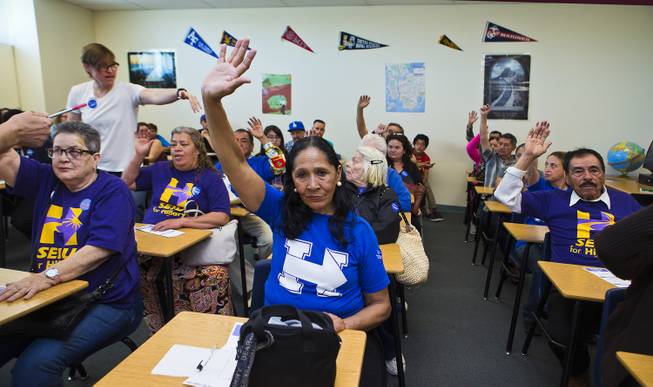
Hand votes are counted for their candidates via precinct during the Democratic Caucus at Rancho High School on Saturday, February 20, 2016. L.E. Baskow
Sunday, May 5, 2019 | 2 a.m.
CARSON CITY — The Nevada Democratic Party, hoping to expand accessibility to its first-in-the-West presidential caucuses next February, has sent proposed changes to the Democratic National Committee that would allow registered voters in the party to participate via virtual online caucuses.
Party officials are still working on many of the details of the proposal, including what such virtual caucuses would ultimately look like — think phone calls, online access, apps — and the security measures that will need to be taken.
Alana Mounce, executive director of the state Democratic Party, said she doesn’t foresee many problems.
“I think the DNC will be really receptive to our plan,” she said.
Under the proposed plan, two virtual caucuses would be held. Voters in Nevada would submit a list of their presidential preferences. Other specifics of the virtual caucus have not been hammered down as of yet, but a similar situation in Iowa would see an online submittal of a ranked list of candidates.
Essentially, under the proposed Iowa plan, a voter would log on and send in a list of preferred candidates. If the voter’s first choice is eliminated, the vote would go to the second choice, and so on.
To participate in the Nevada virtual caucuses, prospective voters must have registered as a Democrat by Nov. 30 and take part in a pre-registration held between Jan. 1-15, 2020. The virtual caucuses will be held Feb. 16-17, 2020. There will be no day-of registration for the virtual caucuses.
Early voting, as well as same-day registration, will be available Feb. 15-18, 2020. The caucus itself will be held Feb. 22, 2020.
Under the new plan, for precincts that elect two delegates, a presidential candidate would have to receive 25 percent of the votes of attendees present on caucus day plus the votes cast in early or virtual caucusing to be considered viable. For precincts with three delegates, the number is one-sixth, and for precincts with four delegates, the number is 15 percent.
The changes were proposed after the Democratic National Convention called on states to increase accessibility during caucuses, up to and including online voting. In 2016, backers of Sen. Bernie Sanders, I-Vermont, pushed back against rules they saw as giving an advantage to Hillary Clinton. In 2018, the party also took significant power away from superdelegates — delegates picked by the party who were unbound to the votes of the public.
The state party said the changes will likely force candidates to invest more time and resources in the state up to caucus day.
Mounce said changes like early voting were made because Nevadans have a tendency to vote early. In the 2018 general election, almost 628,700 voters either voted early in-person or cast mail-in ballots.
“I think the thing that we did was we focused on the changes being Nevada-centric and Nevada specific,” she said.
Assemblyman William McCurdy, D-Las Vegas and Nevada state Democratic Party chair, said in a statement that the changes to the voting process will strengthen the party’s ability to elect good leaders.
“We know that when we come together and every Nevadan is afforded the ability to participate, we elect leaders who put hardworking families first,” he said. “I am confident we will elect the Democratic nominee who will defeat Donald Trump next November and finally have a leader who will make our country one that works for all Americans.”
The succeeding steps in the selection process, the county conventions and state convention, will be held April 18, 2020, and March 30, 2020, respectively.
